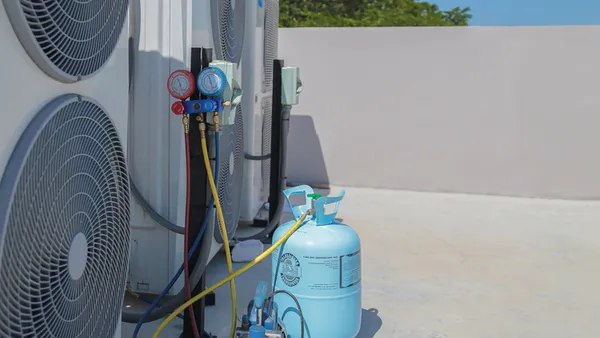Dive Brief:
- A sense of optimism is emerging in the commercial real estate industry as tenants steadily shift back to working full time in the office and lease renewals pick up, property management software firm Building Engines said in its 2024 report on the state of commercial real estate property management.
- The majority of tenant issues come down to comfort, with 66% of respondents saying it is their most common request, according to the firm's survey of 236 property owners, facility managers, operation executives and other commercial real estate professionals. Forty-seven percent said that common requests include faster responses to work orders and maintenance requests, and 22% said they are often asked for upgrades to tenant amenities and better communication with the property management team.
- Forty-six percent of respondents said that managing tenant issues is the most time-consuming aspect of their property management tasks. The report said this suggests “significant opportunity for automation in this area, such as through AI-powered helpdesk systems or tenant services apps,” which could help to streamline communication and resolution management.
Dive Insight:
In addition to tenant relations, 38% of property teams believe that preventative maintenance and inspection tasks could benefit from automation. Opportunities for maintenance automation include the adoption of dedicated property management systems or IoT solutions for schedule management, task assignment, issue tracking, documentation, notifications and follow-ups, the report says.
Thirty-seven percent of respondents said certificate of insurance management is their most time-consuming issue that could benefit from automation, while 32% cited tenant compliance and 27% named energy management and carbon reduction.
The report noted that automation can enable quicker responses to tenant issues, prompting higher occupant satisfaction, as well as drive efficiency, reduce labor intensity and promote “a seamless building operation process.” The demand for automation comes as 33% of respondents say their top focus when enabling engineers is improving work prioritization and management.
Building Engines noted that while prioritization challenges rank as the number one priority for completing work orders, many respondents said that staff shortages also impact that area, likely because understaffed property teams likely have trouble prioritizing work orders by importance. The report says that these staffing constraints may play a role in 18% of respondents naming mobile apps and technology as priorities when enabling building engineers. The technology can help teams to “address multiple concerns from the palm of their hand, communicate with tenants and colleagues, and work on the go from anywhere,” the report says.
Automation can also help teams meet tenant comfort and maintenance requests, the report notes. It says that AI-driven technology like HVAC management systems can automate building temperature, airflow and indoor air quality to ensure an optimal workplace environment for tenants.
Despite a high number of requests for amenity upgrades, investors are split on whether and where to make improvements. While 39% of respondents said in last year’s survey that they would add amenities to their building, only 28% said they would do so this year, according to the report. The number of respondents who were unsure whether they would add amenities also grew from 27% to 39% between 2023 and 2024. The most common amenities being added to buildings include conference rooms, tenant lounges, fitness centers and wellness options, outdoor spaces and EV charging stations.
Sustainability initiatives and ESG reporting are also gaining attention from commercial property teams. The report notes that over the past three years, commercial property teams have continued to prioritize energy efficiency and expense reduction, with 64% planning to prioritize these issues in 2024.
Other sustainability endeavors have shifted, however. The proportion of respondents that named utility bill capture and ESG reporting as a top sustainability priority grew by 10 percentage points this year, compared with 2023. The percentages of respondents prioritizing water efficiency and conservation and pursuing green building certifications fell 4 and 7 percentage points, respectively, according to the report.













